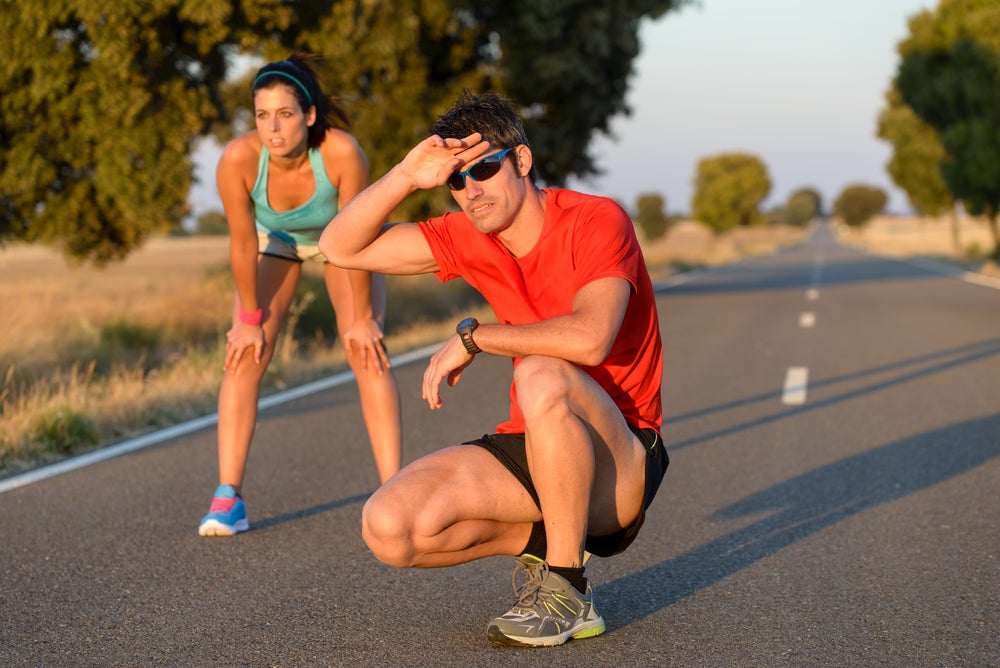Top 5 Nutrition Mistakes Made By Smart Triathletes

Photo: <a href=http://shutterstock.com>Shutterstock.com</a>
You are a smart triathlete: You wake up at 5 a.m., routinely decline a second round of drinks, watch what you eat and are aware of the latest trends in sports nutrition and bike technology. But even the most well-meaning, self-sacrificing, smart triathletes can make nutrition mistakes that prevent them from reaching their body composition and performance goals.
Mistake #1: Not knowing your sweat rate.
You know you should be conducting periodic “sweat tests” in training, right? Studies consistently show that even small (less than 2 percent) decreases in body weight due to fluid loss adversely affect performance. Don’t let dehydration slow you down!
At least 2–3 times per training climate change (winter, spring, summer, fall), weigh yourself nude before and after a one-hour training session. Drink as usual and note intake. Multiply fluid weight loss by 16 (ounces/pound), and aim to drink that total number of fluid ounces/hour during future training sessions.
Sweat rate example: If you weigh 160 pounds pre-workout and 158.5 pounds post-workout, you lost 1.5 pounds from sweat. Multiply 1.5 by 16 to get 24 ounces lost. Add, say, 10 ounces for fluid intake during your training session and you get 34 ounces/hour sweat rate.
RELATED: Tips For Training In Hot Weather
Mistake #2: Inadequate calorie intake during training.
I see triathletes make this mistake repeatedly, either to “save calories in an attempt to drop a few pounds,” or to “practice going on empty.” Studies show both mind-sets are completely backward. Take in 30–60 grams of carbs/hour (up to 80–90 grams/hour for Ironman athletes) to fuel your hardworking muscles and maximize your workout effort. Want to practice mental toughness? Do one of your 100-mile rides solo or train in less-than-ideal weather—don’t train on empty. Bonus: Adequately fueling during training will also curb your hunger later, which translates to calories saved at the end of your day—a much smarter way to drop a body fat percentage point or two!
RELATED: Proper Food Intake While Training
Mistake #3: Skipping post-workout fuel/meal.
As athletes who often do daily double workouts, recovery is paramount not only to performance, but also to optimizing immunity and minimizing injury. Make it a priority to consume 2.2–2.6 grams of carbohydrate/pound body weight in the hour post-workout—even after late-evening workouts! Include some protein (and a pinch of salt) as well to help muscles repair and rebuild stronger. Wash it all down with some much-needed fluids.
RELATED: Whole Foods For Recovery
Mistake #4: Misusing vitamins/supplements.
Sure, we triathletes have higher daily calorie needs, but do we require vitamin supplementation? According to a recent panel of experts, maybe not. As a sports dietitian, I recommend supplementation when warranted, to correct dietary deficiencies in things such as calcium, vitamin D and omega-3 fatty acids. Establish a solid daily nutrition foundation with real food first. Seek individualized advice as needed, and fill in any gaps with supplements if indicated. Supplements are not a “quick fix” for dietary insufficiencies.
Mistake #5: Relying too heavily on the number on the scale.
It is not the lightest triathlete who performs the best; it’s the strongest, healthiest one who trains consistently without injury or illness. Yes, losing excess body fat will help you improve performance, but constant under-fueling to achieve or maintain a super-lean body will not. Use body weight and body fat measurements as well as power output or other measurable results to best assess your “ideal weight.” Need help? Seek advice from a certified sports dietitian who can test your body fat and resting metabolic rate to help you come up with a smart fueling and weight-loss plan.
RELATED: Beware The Weekend Binge
Clinical nutritionist and certified sports dietitian Lauren Antonucci is the owner/director of Nutrition Energy in New York City.